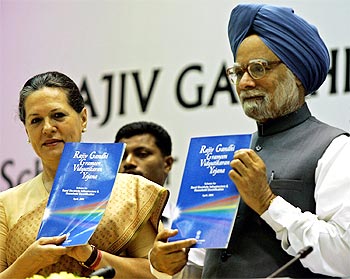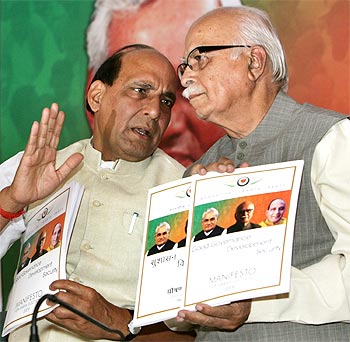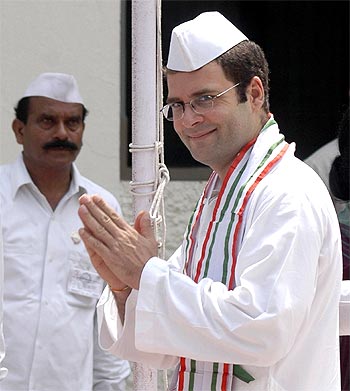Photographs: Adnan Abidi/Reuters
Gupta's is an intellectual's voice speaking for the weakest and has to his credit books like Rivalry and Brotherhood: Politics in the Life of Farmers in North India and Interrogating CasteA/A>. His book Learning to Forget: The Anti-Memoirs of Modernity revisited the idea of modernity.
His latest book The Caged Phoenix: Can India Fly? is a must read because Professor Gupta refuses to buy India's so-called success story. The book shows the limits of the Indian growth story and throws light on the backwardness in society.
Professor Gupta, who was until recently with New Delhi's Jawaharlal Nehru University, exposes 'how the wealth of a few is intimately tied to the poverty of many.' He says growth does not automatically ensure development and huge resources of talent do not guarantee excellence. His questions indicate that in spite of rich human resources, India is still waiting to fly.
In an interview with to rediff.com's Sheela Bhatt, he looks at the 2009 election, post-election developments in the Bharatiya Janata Party and the newly-formed United Progressive Alliance government.
On seeing the mess in the BJP's leadership in New Delhi, many people have started talking about the possibility of a unipolar polity at the Centre in the short term. Do you think this latest term of UPA-II will be dominated only by the Congress?
Unless something untoward happens, I don't think there will be any major opposition to the UPA-II. But I think our politics will not be unipolar.
In India, there are so many different fractions, different interests and views. The Congress can take care of only some of them. The BJP can take care of some of them.
If for some reason the BJP collapses -- I don't think it will -- then some other formation will come up to take what the Congress is unable to absorb.
India is not in any way near unipolar politics. It will continue to be a democracy that has got competition.
I am not sure about the regional parties. Slowly, they will find themselves difficult to sustain. If some national party comes up to oppose the Congress, the regional parties may get space as it happened in the 1960s and 1970s.
I think the BJP as organisation cannot be written off. It is always there on the cards. That mindset has not gone. Right now, those people may not find their politics interesting, but the mindset is still there and I don't think it will go. So, I think it won't yet be a unipolar polity.
Have you read Sheela's earlier interview with Professor Gupta: 'No constituency in India can be won on caste grounds''The image of the BJP is of a party that is always complaining'
Image: BJP President Rajnath Singh and Leader of the Opposition L K Advani, who is also a senior BJP leaderPhotographs: B Mathur/Reuters
The Congress has done one thing right -- it has given everybody the impression that it is working on something. It is trying to do something. You know, it has not done anything extraordinary. It has not delivered anything of a high-level. It has done the usual things -- some good, some bad and some indifferent.
The reason why the BJP is not scoring at all is because the BJP does not give the impression that they are trying to bring in change or they will try to make the difference.
The Congress's position is that it is trying to do things, it may not be completely successful but at least it is trying. So, the Congress is getting votes today for trying.
The BJP does not have the image of a party that wants to make a difference. The image of the BJP is of a party that is always complaining. They talk negative kind of things. During the general election, the BJP said if 'we got elected, we will hang so and so.' They asked how the Congress promised certain things and how little they had actually done. The BJP didn't say what they have done and what they will do.
After the victory the Congress got down to tackling the economy. I think the country was ready to forget identity politics. We had it enough. The NREGA (National Rural Employment Guarantee Act) scheme, insurance for the small scale sector and rural poor -- were all pipedreams but nothing really happened in the last many years.
The very fact that government was talking about it in great details showed that here are the people who want to do things. Manmohan Singh's winning point was that he is an economist. Somehow, people think that an economist can correct things.
What did Sonia Gandhi do that helped the Congress win?
The Congress party and Sonia were able to give the impression that they have programmes in place that will be implemented. Sonia Gandhi and Rahul Gandhi have given the impression that they are interested in making the change. Whether they can make the change or not is a different matter. But they have given the impression.
The BJP was not showing the way forward, they were saying 'we will correct the wrongs.'
After winning two successive elections Sonia Gandhi's career has reached a new peak. How do you see her career progressing?
To remain in power she would be advised to remain the Congress president and not be prime minister. I think the next person to take over will either be Rahul Gandhi or someone else or someone younger, but very much under the control of the family. Because, there is no doubt about it that the Congress party needs the Gandhi family.
Also read: Sam Pitroda on the Rahul Gandhi he knows'Rahul Gandhi is pragmatically oriented'
Image: Rahul Gandhi in Allahabad.Photographs: Jitendra Prakash/Reuters
In Uttar Pradesh, the Samajwadi Party and Bahujan Samaj Party didn't do very well. People have seen through the Yadavs and OBCs (Other Backward Classes). It (the OBCs) was not a winning card at all. Mayawati didn't do well with the alliance with Communists which made no sense at all.
UP was the winning factor for the Congress. UP gave the ideological fillip to the Congress. Wherever the Congress said it wants to do something and wherever the BJP was in a position to show that it has done something they won.
For the first time, I see the clear demonstration that the anti-incumbency factor will not work always. In a way you might say that the political temper in the country is consolidating and there won't be great ups and downs.
That period where people could get away without doing anything is going to get over, slowly. The BJP and Congress, wherever they have worked, they have got votes.
In Madhya Pradesh and Gujarat, the BJP has shown that they can deliver. See, the majority of people don't care very much about certain issues. Riots happen once in ten years.
People are worried about their daily routine, food, education etc.
The message of the 2009 election is to be positive. Give the impression to the voters that you are going to deliver. It's not ideology so much, it is action that will get votes.
Does that also mean that people are not worried about issues of security as raised by the BJP and hawkish Hindu elements?
People are worried about it, but it comes and goes. See, what the BJP did wrong was that it didn't criticise those who were beating up girls in pubs and restaurants. A lot of girls of middle class, middle-middle class and lower middle class families of small towns are wearing jeans, t-shirts. Their girls are working out, working in coffee shops. Parents do not want their girls to be attacked. That incident went down very badly for the BJP.
How do you see Rahul Gandhi's role in the election?
I think it was a positive one for the Congress. As I said, he didn't talk against the BJP. He didn't talk about an ideological programme. He seems to have suggested that 'we are going to work for the poor.' Without getting swayed by ideological considerations he says that we are going to deliver.
Rahul Gandhi is a very good example of the person who is not ideologically motivated. He is more pragmatically oriented. This is the impression he is able to give.
I have met lots of people who are close to Rahul Gandhi. Nobody talks about the Congress ideology, secularism or any such issues. They think this man is honest who wants to deliver. He stands along with Sonia Gandhi and Manmohan Singh. These people think that these three are honest people. They are not burdened by ideology.
BJP supporters are burdened by ideology. People don't want that kind of ideology; they want straightforward doers.
You must read Syed Firdaus Ashraf on Rahul's plans to capture UP



article